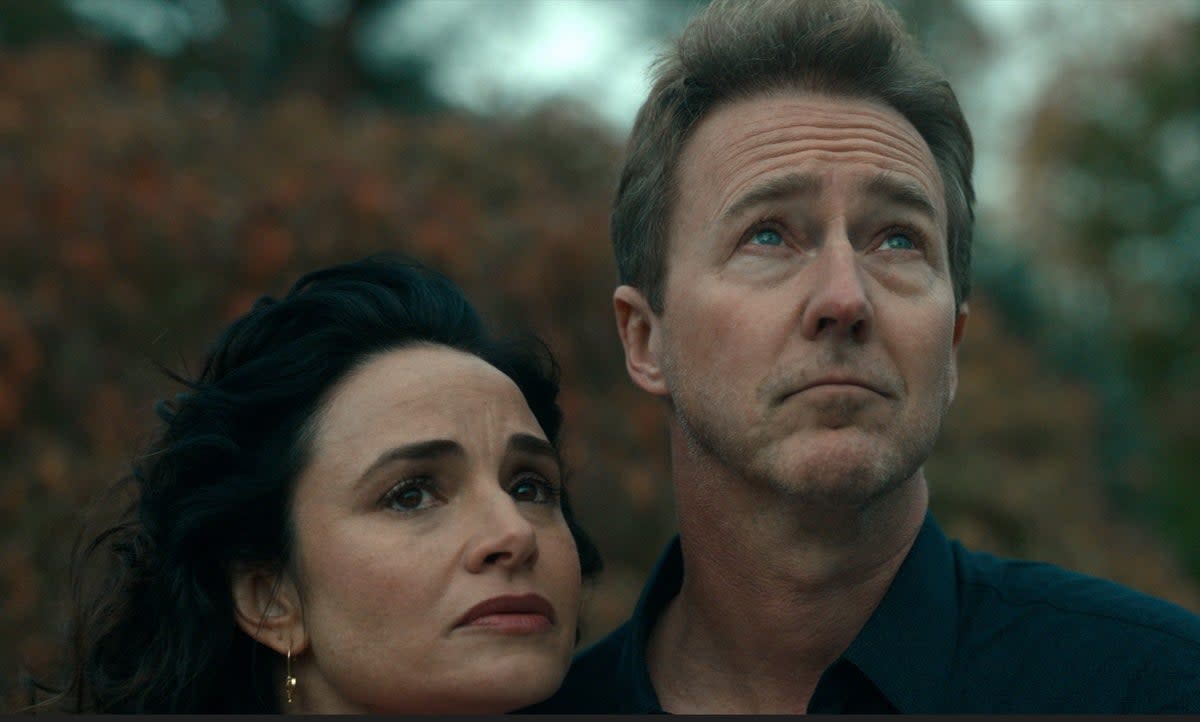Extrapolations review: Star-studded climate change drama is both patronising and predictable

The number of great works of art about climate change could be counted, comfortably, on the single hand of a soon-to-be-extinct orangutan. As with all the most pressing issues of our time, the process of converting dismal reality to affecting art is an alchemy too far. It either renders the product sentimental and sensationalised, or indigestible in its over-cooked virtue. Extrapolations, the big-budget AppleTV+ anthology about a world on the brink of ruin, achieves something quite extraordinary: it manages to be both sappy and sermonising.
The action begins in 2037, as fires tear through the Middle East and sea levels threaten low-lying cities. As governments scramble to agree new climate accords (we see negotiators at COP42 in Tel Aviv), tech genius Nick Bilton (Kit Harington; not good for my SEO), and his company Alpha, could hold the key. Their patents for desalination technology would allow a parched Earth some respite – but what are the conditions that will be placed upon freeing up this lucrative invention? It could all lie in the metals and minerals under the melting ice of the Arctic (Apple does, after all, know a lot about batteries).
Extrapolations creator Scott Z Burns is best known as the writer of Steven Soderbergh’s Contagion, a 2011 film that gained renewed attention during the Covid-19 pandemic. With Extrapolations, Burns turns his quill to the climate crisis, a somewhat easier calamity to predict. The story arc takes place over the course of 33 years, at the start of which people say broadly sane things, like, “You can’t negotiate with a fire or a floor or a famine!” But the show rapidly descends into science-fiction, as multinational collaboration on carbon neutrality gives way to a man being murdered by a vengeful walrus, not to mention a technology that instantly translates whale song into perfect English. “Now becomes next,” rumbles the gnomic Meryl Streep-voiced humpback whale, “until we fall away and return what is taken.”
Apple has long been a broadcaster of varying moods, torn between the “humanity is good, actually” outlook of Ted Lasso and the “humanity is terrible, actually” perspective of Severance. In a way, Extrapolations is the apotheosis of this dichotomy: a deeply pessimistic take on the Earth’s future, paired with an almost childlike hope for its survival. “Humanity’s frying,” Edward Norton’s Jonathan Chopin tells mastermind Bilton. “And you look at the temperature as an inconvenience you have to tweak to optimise your investment strategy!” By 2070, when the show ends, the world is just about still habitable, and international courts are putting people on trial for “ecocide”. Climate justice, of a kind.
As far as casts go, Extrapolations must rank amongst the most glittering ever assembled. From Meryl Streep to Edward Norton, Tobey Maguire to David Schwimmer, the buffet of A-listers is endless. Some, like Sienna Miller and Daveed Diggs, get meatier roles, others, like Judd Hirsch and Heather Graham, are missable in a long blink. But clearly Tinseltown was enthusiastic about the project, because there’s nothing that the rich and famous love more than preaching optimism to the unwashed masses. It all feels rather like Gal Gadot’s much-maligned “Imagine” video, though, incredibly, there is no crossover between the two glistering ensembles. Clearly participants in the former had learned a chastening lesson.
Because Extrapolations is both patronising and predictable. The villains are all rapacious industrialists, the heroes all scientists or spiritualists. For a show that is so concerned about the impacts of climate disaster, Extrapolations features scarcely any climate refugees or, you know, poor people. Instead, the protagonists are all senior executives, politicians, engineers, and lawyers. And, as disaster after disaster befalls our blue planet, the rich only seem to get richer, the poor only more invisible. This would be more permissible if the show were more fun, but it’s relentlessly hectoring, peppering every other line of dialogue with statistics about the dire state of existence. Even the character of Bilton – a proxy for all the excesses of late capitalism – is little more than a vapid sypher (though Harington clearly has fun with prosthetics that make him look like a Ken doll). “It’s all just one giant self-regulatory feedback loop, isn’t it?” he snarls. Is it though?
Activism rarely makes for good art, but Extrapolations doesn’t really aspire to that. There was infinitely more humanity on display when Al Gore got his slideshow out in An Inconvenient Truth than there is in this glossy, condescending melange of speculative fiction. It is symptomatic of the sort of pompous corporatism that has done far more to end the world than to save it.

 Yahoo News
Yahoo News 
